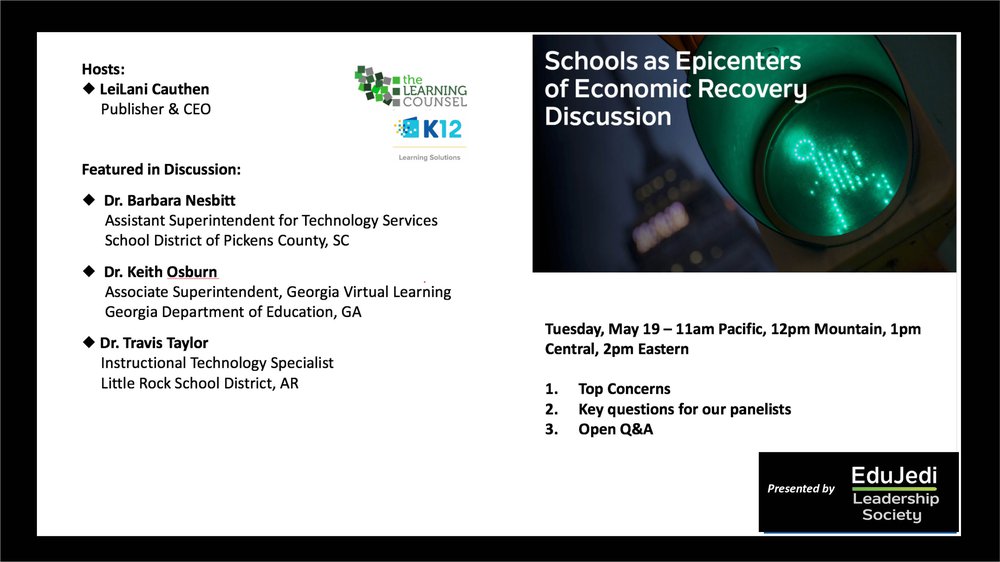After the devastation COVID-19 has done to the American economy, many of us don’t know how we can help. The simple truth is that now as always, there is a direct and immediate relationship between education and the economy. As the recovery begins, schools are finding themselves at ground zero in the economic recovery efforts. Their importance is crucial, and this Learning Counsel virtual discussion will help you and your team to stand on the front lines, as schools become the epicenters of our economic response to the Coronavirus pandemic.
According to LeiLani Cauthen, CEO and Publisher of the Learning Counsel, “Not everything needs a college degree. There are people who may understand how to use Microsoft Office or they are in sales and related, or they receive systems training once they're on the job. Food prep and serving is where we've lost the majority of our jobs. So far, very little has been lost in transportation or materials movements, a little bit in manufacturing production, and almost none in the education sector, which is one of the big six in terms of size of employment. There are areas of work that are unique. So that leads us to the assumption that if you look at the entire list at the federal database of available jobs, there is a lot of not understanding what careers are actually out there.”
Dr. Barbara Nesbitt, Assistant Superintendent for Technology Services at Pickens County SC said, “One of the focus areas that we have here in our district is a focus on work, apprenticeships, job shadowing, and some real life experience in high school. And so we actually have a work facilitator who works closely with our area businesses to ensure that each of our students, which is our goal to have some experience before they leave high school in the real world, is in a real job. For us, it's defined as at least a hundred hours as a minimum for our students to have some kind of job shadowing or real-world work experience. And one of the things that we do here in our district is we actually model that by hiring 200 students every year in student-based work learning.”
Dr. Keith Osborne is the Assistant Superintendent at Georgia Virtual Learning in the Georgia Department of Education. According to Osborne, “We have 1.7 million children in Georgia, and here's the dynamic that you need to be aware of. 46 percent of them are in our elementary schools. So nearly half of our children are still very, very young. Georgia is very proud of the fact that we are considered to be one of the top States in the nation to come and do business with, to start a business. And to that effect in February of this year, our unemployment rate was 3.1. That was one of the lowest in the nation. Now you can only imagine what it would be today. I couldn't even tell you what it is today, because it's just changing dramatically by the day, simply because of, of the situation that we have within society.
“Where it really gets to be very important is that you and I, we all know there's a direct relationship between economic growth of a state and the skills of its workforce, and where do those skills come from? Well, certainly they're going to come from our state's schools. And so as a result of that, now you see that fundamentally, this is so important, not just to us as educators, but to everyone that works for a state. That goes all the way from the governor all the way down to our teachers and, and the impact that we then have”
Dr. Travis Taylor, Instructional Technology Specialist at Little Rock School District said, “Some of the things that we are pushing the kids towards are in the field of streaming. It's not just about holding a phone up in front of you, but there's actually production and things that are involved with streaming. And this is actually an offshoot of what's happening in Esports sports because Esports has generated a whole new level of skill sets. It's not just the students who are competing, but we're having those who are getting ready to broadcast and do production. So the whole thing with COVID is making us really, really look at how we're going to view what is normal and take a look again at how we're educating, how long we're educating and what are those outcomes could be.”
Perhaps summing it up, Dr. Nesbitt said, “We believe that strongly that the only way to truly personalize learning for students is to empower them. And I know that our other guests focused on this as well, but for us empowering learners to be able to make decisions to make mistakes, to know how to choose that everybody doesn't have to be doing the same thing all the time, even when we were back in face to face instruction altogether, I think is a critical mindset that needs to be developed from the time kids are in elementary school. We need to start developing that mindset when they come to us as three, four or five-year-olds.”
Watch the video
This is a fascinating discussion that drives home the point that economic prosperity starts in the schools, and that economic recovery will be driven by what we do in our own schools and districts. Schools are the starting place, the epicenters of our economic recovery. You’ll want to watch this discussion, and be the catalyst for recovery in your community.











